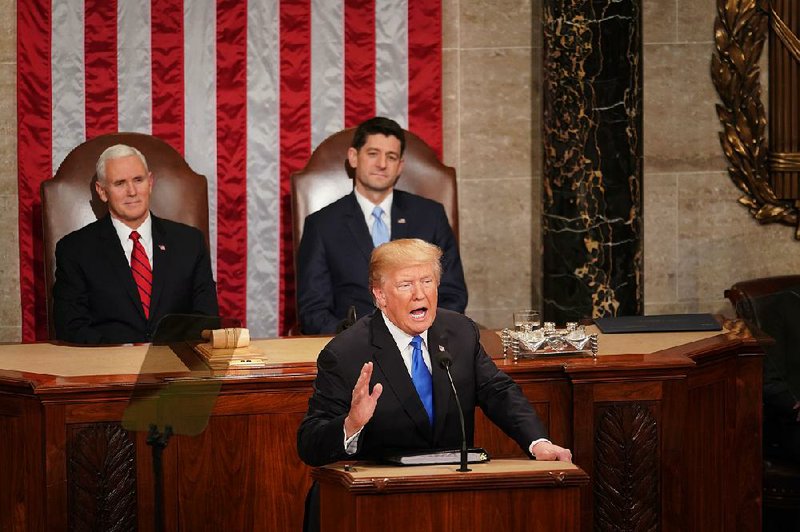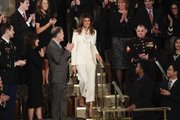WASHINGTON -- In his first State of the Union address, President Donald Trump on Tuesday challenged lawmakers to set aside their differences and join him in making good on promises to fix the nation's infrastructure and immigration systems.
Speaking to a joint session of Congress, Trump hailed what he called the "extraordinary success" of his administration's first year and sounded notes of unity and inclusion, steering clear of the nationalist rhetoric, political attacks and confrontational tone that have been his calling cards both as a candidate and as commander in chief.
"Tonight, I call upon all of us to set aside our differences, to seek out common ground, and to summon the unity we need to deliver for the people," Trump said to applause from many Republicans, who frequently stood in support of his remarks.
Meanwhile, a cluster of about two dozen Democrats, including members of the Congressional Black Caucus, remained planted firmly in their seats, staring sternly at the president and withholding applause.
[FULL TEXT + COMPLETE VIDEO: President Trump's 2018 State of the Union address]
In the address, Trump emphasized the achievements of his first year in office. He devoted significant time to touting the tax overhaul he signed at the end of last year, promising that the plan will "provide tremendous relief for the middle class and small businesses."
"Since we passed tax cuts, roughly 3 million workers have already gotten tax cut bonuses -- many of them thousands of dollars per worker," Trump said. "This is our new American moment. There has never been a better time to start living the American dream."
Trump pointed out small-business owners from Ohio, who he said had just had the best year in the 20-year history of their business. Because of the tax overhaul, he said, their business is expanding its space and hiring new workers.
While some employers have publicly credited the tax cuts for recent bonuses that they've issued to workers, some of the money may have been paid out regardless of the cuts because of the nation's tight labor market and strong economy. The director of the White House National Economic Council, Gary Cohn, said on Fox News before Trump's speech that the 3 million figure includes "some type of tax bonus or wage increase or pension increase" awarded to workers.
Cohn said more than 350 companies have made "announcements in direct reflection of what we've done with taxes."
Trump also celebrated the end of a provision from former President Barack Obama's health care law, which required many Americans to obtain health insurance or pay a penalty. "The individual mandate is now gone. Thank heavens."
He spoke about potential agenda items for 2018 in broad terms, including a call for $1.5 trillion in new infrastructure spending and partnerships with states and the private sector.
"Together, we can reclaim our great building heritage," Trump said during his address. "We will build gleaming new roads, bridges, highways, railways and waterways all across our land. And we will do it with American heart, American hands and American grit."
A more detailed proposal, which aides say will be unveiled in the next week or two, would be the first marquee initiative from Trump that will require strong bipartisan support in Congress to pass.
Tackling the sensitive immigration debate that has roiled Washington, Trump redoubled his recent pledge to offer a path to citizenship for 1.8 million young illegal aliens -- but only as part of a package that would also require increased funding for border security, including a wall along the U.S.-Mexico border, ending the nation's visa lottery method and revamping the current legal immigration system.
Some Republicans are wary of the hard-line elements of Trump's plan, and it's unclear whether his blueprint can pass in Congress.
'PEOPLE ARE STRONG'
The president delivered his address as investigations are intensifying into Russian interference in the 2016 election and whether Trump or his associates helped the effort or obstructed justice. As he took the dais at the Capitol, Trump had the weakest approval rating of any president of the modern era entering his second year in office, with 39 percent of Americans approving of his performance in the job.
But he stepped behind the lectern still popular with his most ardent supporters, who see him as an unpredictable and entertaining commander in chief who posts vitriol on Twitter against the advice of the White House staff, the Republican leadership and some close advisers.
Despite calling for bipartisanship Tuesday night, Trump has made aggressive attacks a hallmark of his political style and the first year of his presidency, using his Twitter account to attack celebrities, Democrats and members of his own party and Cabinet. In politics, his first year was marked by sharp partisanship, with Republicans using special rules to force through the tax overhaul over Democratic objections.
Last week, Trump used Twitter to taunt the Senate's top Democrat, Charles Schumer of New York, for not agreeing to a bipartisan immigration deal. That tweet came after a three-day government shutdown, which ended when Democrats backed down.
"Cryin' Chuck Schumer fully understands, especially after his humiliating defeat, that if there is no Wall, there is no DACA," Trump wrote, referring to Deferred Action for Childhood Arrivals, the Obama-era program that granted protections to young illegal aliens who were brought to the U.S. as children.
Still, on Tuesday night, Trump struck an optimistic tone, citing the resilience of the American people in the wake of natural disasters such as hurricanes and wildfires and the mass shooting in Las Vegas.
"The state of our union is strong because our people are strong," Trump said.
Trump also played to the culture wars, alluding to his public spat with professional athletes who led protests against racial injustice by kneeling during the national anthem, declaring that paying tribute to the flag is a "civic duty."
On international affairs, Trump warned of the dangers from "rogue regimes," such as Iran and North Korea, terrorist groups like the Islamic State, and "rivals" such as China and Russia "that challenge our interests, our economy and our values." Calling on Congress to lift budgetary caps and boost spending on the military, Trump said that "unmatched power is the surest means of our defense."
And he highlighted the decision made early in his first year to withdraw the U.S. from an Asia-Pacific trade pact, declaring: "The era of economic surrender is totally over."
Most presidents have made sure that there is a choreographed rollout of political messages and policy prescriptions before a State of the Union address. But Trump's past week has been consumed by the revelation that he sought last year to fire Robert Mueller, the special counsel leading a Russia investigation, and by the abrupt departure Monday of the FBI deputy director, Andrew McCabe, whom the president had railed against as politically corrupt.
At the same time, Republicans are pushing to make public a classified memo that they say shows a politically driven effort by the FBI and the Justice Department to malign Trump with manufactured allegations of links to Moscow. Democrats say the memo is a set of cherry-picked facts to distort the origins of the Russia investigation and undermined the inquiry.
Trump also listed what he views as other key successes during his first year in office, including the confirmation of Neil Gorsuch to the Supreme Court, the rollback of regulations, a $1.5 trillion tax cut, the defeat of the Islamic State in Iraq and Syria, and historic gains in the stock market.
Trump delivered his roughly hourlong speech almost verbatim from a teleprompter, staying uncharacteristically faithful to his prepared script as he paused for ovations, savoring the opportunity to promote his agenda and to tout the strength of what he called "one American family."
In a break with tradition, first lady Melania Trump traveled to the Capitol ahead of her husband. Those sitting alongside the first lady included an Ohio welder who the White House says will benefit from the new tax law and the parents of two Long Island teenagers who were believed to have been killed by MS-13 gang members.
Aides said the speech was drafted over several weeks, with the president offering handwritten edits and sending aides ideas for passages and catchphrases. Aides involved in the writing of the address included senior adviser Stephen Miller, staff secretary Rob Porter and speechwriters Vince Haley and Ross Worthington.
Information for this article was contributed by Julie Hirschfeld Davis and Michael D. Shear of The New York Times; by Julie Pace and Zeke Miller of The Associated Press; by John Wagner, David Fahrenthold and Sean Sullivan of The Washington Post; and by Justin Sink, Mark Niquette, Laura Litvan, Margaret Talev and Jennifer Jacobs of Bloomberg News.
RELATED ARTICLES
http://www.arkansas…">State's GOP delegation gives high marks to speechhttp://www.arkansas…">Other side pushes Democratic visionhttp://www.arkansas…">Ginsburg voices judiciary partisan fears, skips Trump speech
A Section on 01/31/2018

